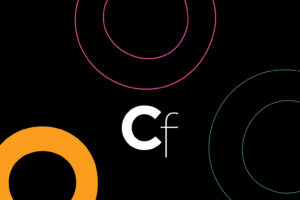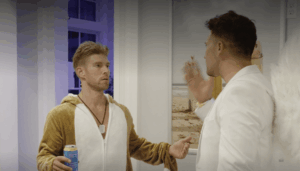Columbia Students Honor Mahmoud Khalil in Unofficial Commencement


This morning, May 21, a chorus of boos directed at Columbia University’s Acting President Claire Shipman resonated through the crowd of thousands at the school’s official commencement. It was a marked contrast from the scene at St. Paul and St. Andrew United Methodist Church in Manhattan three days ago on Sunday evening, where a rendition of “We Shall Overcome” rang through as graduating students from Columbia and New York University (NYU) walked in blue and purple regalia at an event that was decidedly not a sanctioned commencement ceremony.
Organizers called this weekend’s gathering a People’s Graduation, one in which students who stood up for the rights of Palestinians would be honored. It was the second year in a row that such an event was being held: Last May, hundreds attended a similar counter-commencement at the Cathedral of Saint John the Divine, days after Columbia called police on campus to arrest pro-Palestine protesters.
At the head of Sunday’s queue of students was Noor Abdalla, the wife of recent Columbia graduate Mahmoud Khalil, who was arrested by immigration forces in March. Khalil was scheduled to walk in cap and gown today in Columbia’s official ceremony; instead, he is more than a thousand miles away in an immigration detention facility in Louisiana.

Amidst thunderous applause and cheering, Abdalla walked across the stage cradling their newborn son, Deen, who was wearing a tiny graduation cap with a Palestinian flag.
“It was heartbreaking,” Layla Saliba, a friend of Khalil, said about Abdalla’s speech. “There was hardly a dry eye in sight.”
Khalil may not have walked, but at the People’s Graduation, he was everywhere. Photos of him were projected onto the wall behind the stage, and his name was splashed across banners hanging around the church, printed on giant posters of his diploma, and invoked in chants that would ring out ever so often, calling for him to be freed.
There was even a seat reserved for Khalil in the front row.



Carly Shaffer, a Jewish student at Columbia and one of the organizers of the event, is graduating from the same school Khalil was in, the School of International and Public Affairs (SIPA). “In order to have Mahmoud celebrated to the extent he should be celebrated at his graduation, we needed to make our own graduation, separate from the SIPA graduation,” Shaffer told Hyperallergic.
Abdalla spoke from the pulpit, tearing up on occasion, overwhelmed by the emotions of celebrating Khalil’s graduation in his absence.
“Mahmoud [Khalil] has never worn a cap and gown — never had the moment to be publicly celebrated for his academic achievements. Before he was detained, I was overjoyed that he would finally experience this milestone,” she said. “But like witnessing the birth of our son Deen and the first precious month of his life, this moment was stolen from him, too.”

On the left hand side of the stage, surrounded by bouquets, keffiyehs, and a Columbia graduation gown, stood an installation featuring three diplomas — one for Khalil, another for Abdalla, and a third for their son. The infant’s diploma rested on a chair draped with a green onesie. Emblazoned in white letters across the garment: “When I grow up, I want to be like my daddy.”
As in last year’s counter-commencement, Palestine was at the heart of this People’s Graduation. Speakers referenced the ongoing devastation in Gaza while alluding to personal anecdotes about their Palestinian parents, friends, and loved ones in their speeches. Intricately embroidered traditional thobes and keffiyehs to bedazzled watermelon bags and graduation caps embellished with Ghassan Kanafani quotes—Palestine was worn.


Friends of Khalil brought along remembrance pins decorated with red poppies and printed with names of students in Gaza who were killed before they could graduate. “You never let us forget that every university in Gaza had been destroyed — that you held in your hearts, Palestine,” Barnard Professor Shayoni Mitra said in a speech.
“Here, at this church, I felt more like a Columbia student than I have on campus,” said Saliba, a Palestinian-American student who is graduating from Columbia this week.
Aidan Parisi, a Columbia student who was recently expelled by the university over their role in the takeover of Hamilton Hall last year, said the event filled them with mixed emotions.
“I think bittersweet is a great way to describe it,” Parisi said. “It’s really empowering to see a lot of my classmates continue this fight for a free Palestine. But it is also a little hard to know that it came as so much of a sacrifice for so many of us, and knowing that Mahmoud can’t be here with us is really disheartening.”

A Palestinian-American graduating senior at Columbia who spoke at the event, Maryam Alwan, addressed students who, like Parisi, had been on the receiving end of punitive action from their university.
“For those of you who were unjustly suspended or expelled by Columbia, your graduation doesn’t need to be marked by a piece of paper or a stage,” said Alwan.
Last week, NYU’s Gallatin School withheld the diploma of a student commencement speaker, Logan Rozos, who spoke of the “atrocities currently happening in Palestine” during his speech.
“What is the value of a diploma from an institution so empty at its core that it could do such a thing?” said James Schamus, a film studies professor at Columbia and emcee for the evening, reflecting on NYU’s actions. “And the immediate answer might be: Nothing.”

Shaffer described Sunday’s event as “a beautiful night of unity, celebration, mourning, and grief.”
“This is our way of saying that no matter what the Trump administration and Columbia University continues to do, Palestinians deserve to live, they deserve to be honored, and we as the Columbia community will continue to make sure that happens,” Shaffer said.
“You graduated in every protest, in every teach-in, and in every community building event,” added Alwan. “You graduated in the strength it took to resist a system that sought to silence your principled opposition to genocide.”





